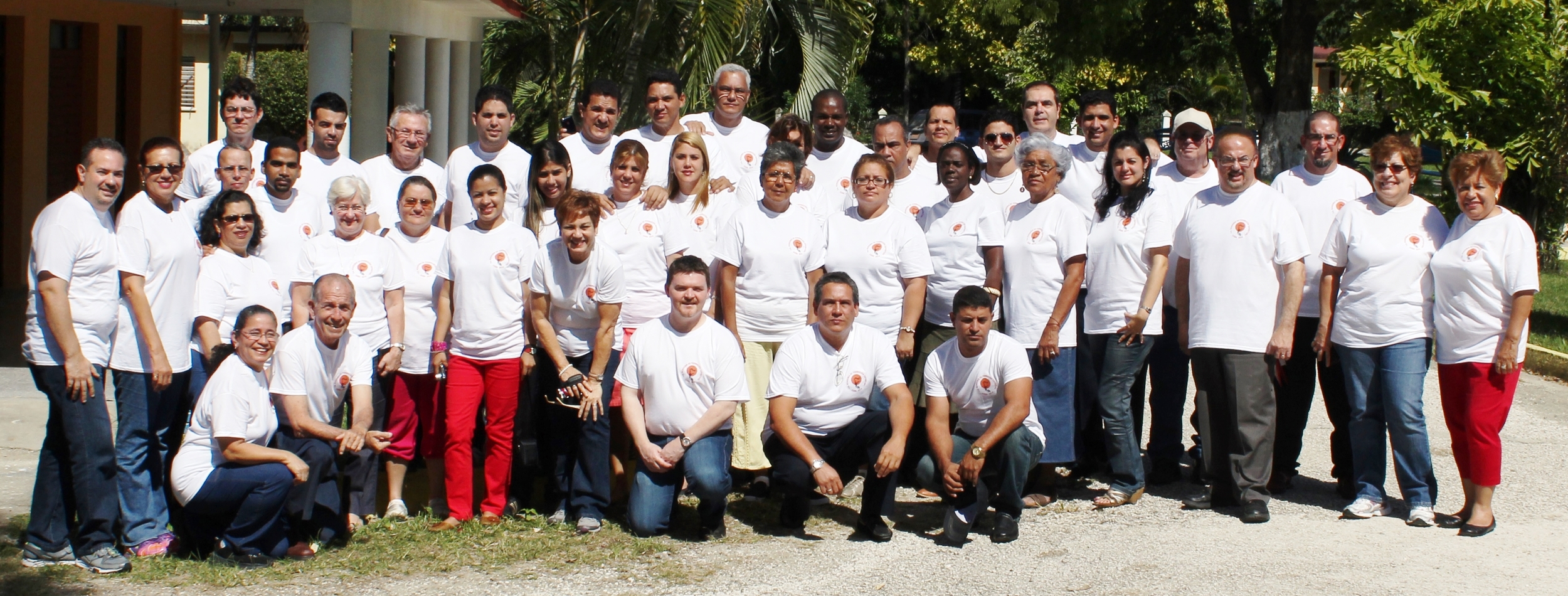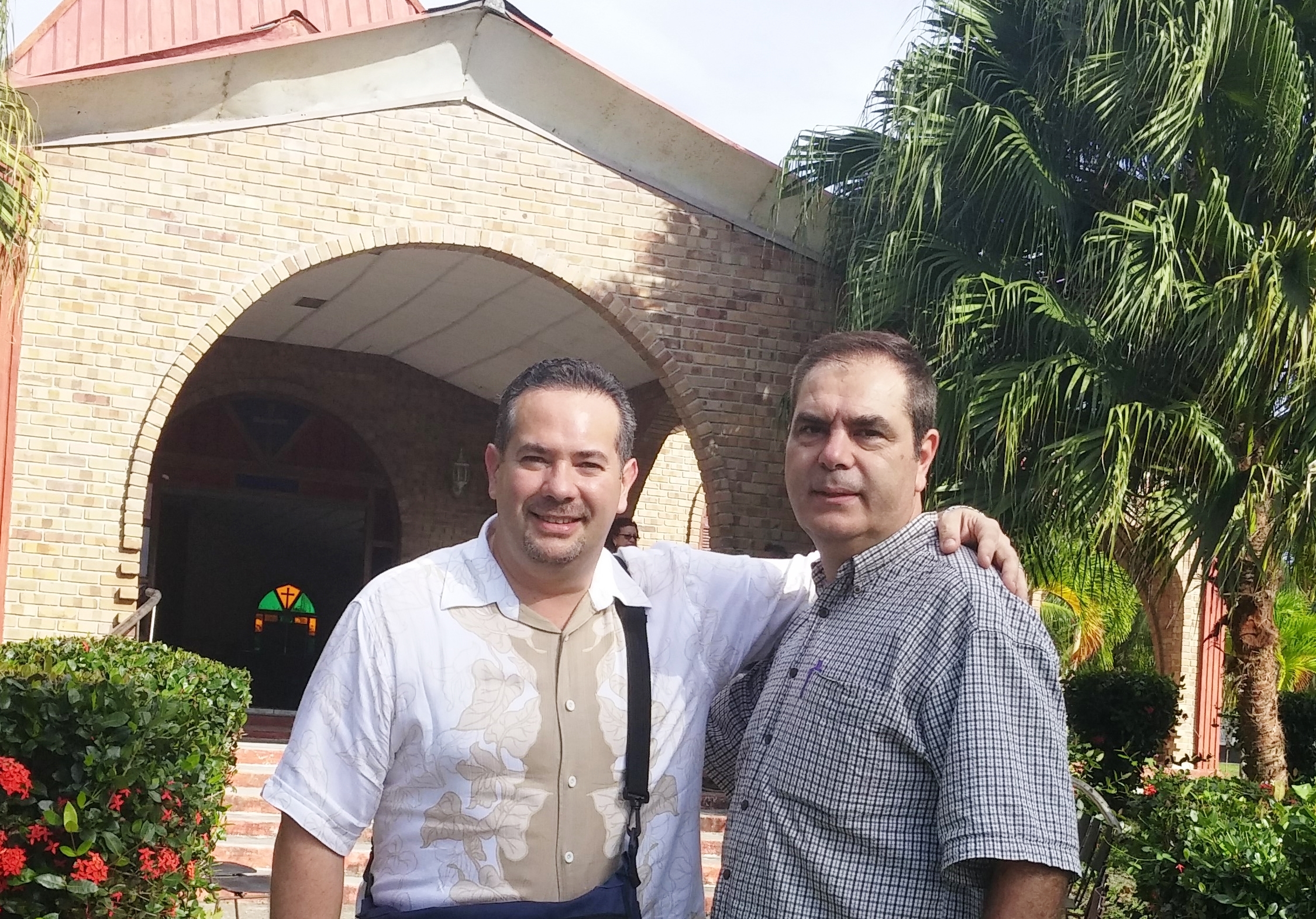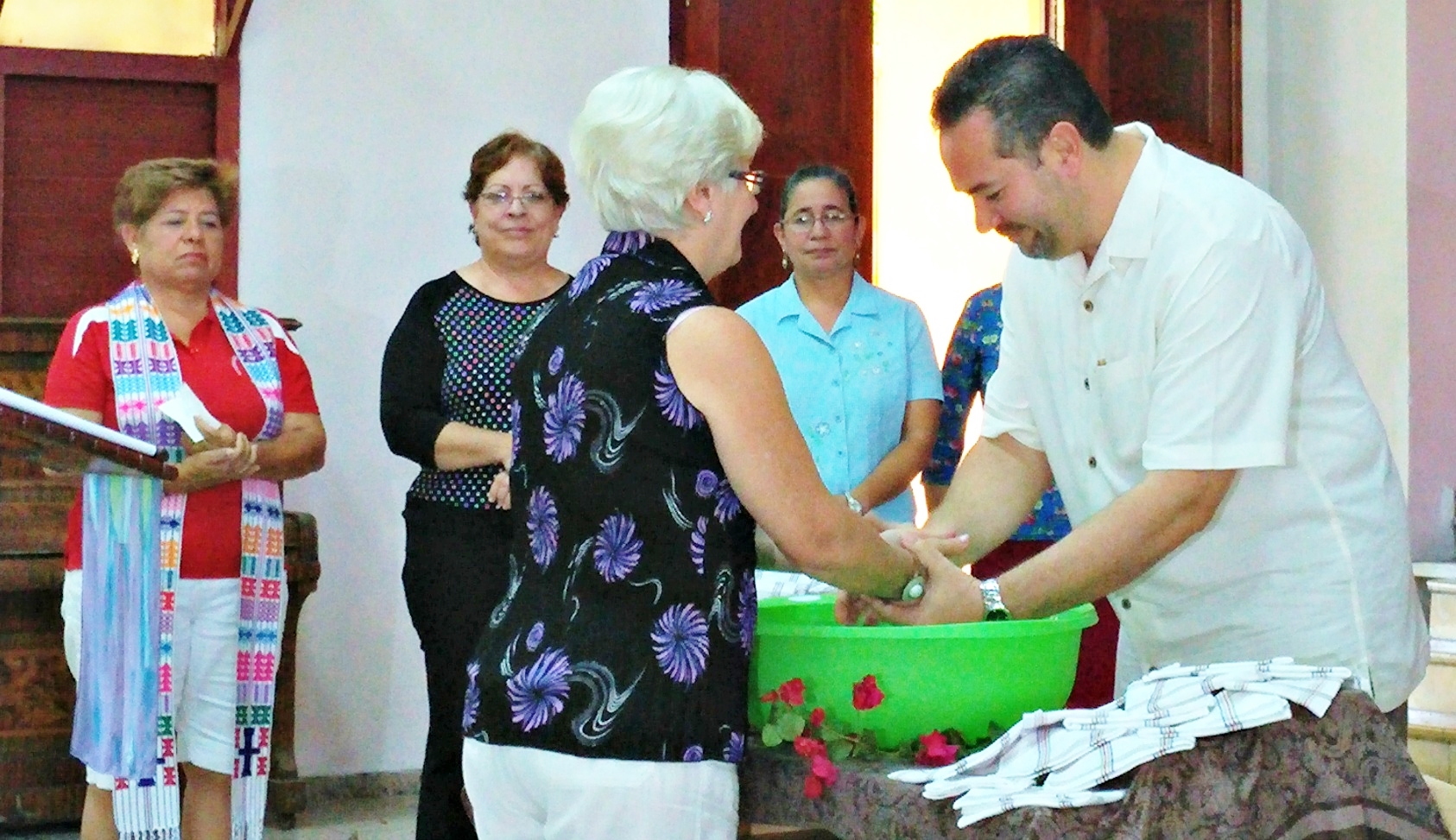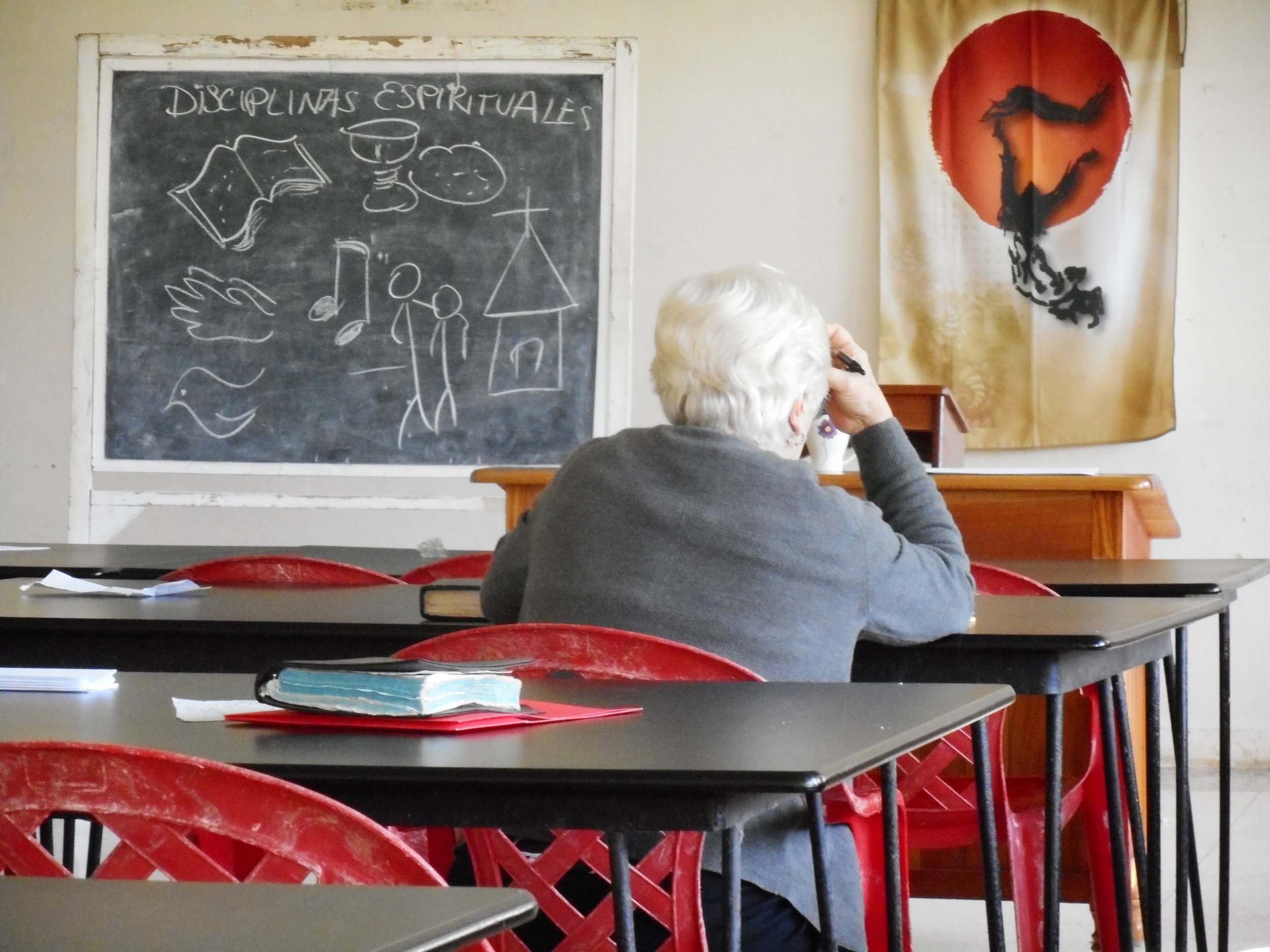This is actually the second time I’ve spoken at a CBF of Florida gathering. The first was 15 years ago, when as a college student I drove from Palm Beach Atlantic College, up 95, to a meeting in Vero Beach or Stuart, I think. That day I had no manuscript, just notes scribbled on the back of an offering envelope, I confess, but I thanked you for a scholarship I received to support my education as one who felt called to ministry. I told you what it had meant as a young person, passionate about learning and cultivating theological curiosity, to have a network of support that encouraged that. I shared what it meant to me to have a sense of home and connection, and I remember the embrace I experienced afterward. I remember feeling guilty I hadn’t done more than scratch some notes on an offering envelope, and I remember driving back, feeling an even deeper appreciation and understanding of what that place of belonging could mean.
Sometimes peers and others will ask me why I still invest in a denomination, or a “denominetwork” as Suzii Paynter describes CBF, and I point to experiences like that, and people like you. I think of growing up in church with Pat and Carolyn Anderson and having T and Kathy Thomas move in just down the street from us when they came stateside after service abroad. I think of a Saturday spent on the roof of CBF Florida’s ministry site in Homestead, laying the plywood base, while a volunteer foreman in yellow measuring tape suspenders urged me to stop choking up on the hammer. I think of when my grandfather passed away, noticing that my grandmother wanted memorial gifts made to CBF Florida, and I know that sense of home, connection, heritage is part of me today.
Of course, you and I realize that it’s not always that way. Not for everyone . . . Especially among those early 20’s college students that I used to be. I heard recently the story of Andrew Forsthoefel - a 23 year old with that combo of college degree and no real job prospects that is all too familiar these days. Andrew decided to try walking across the Continental United States, from his home in Philadelphia all the way to the Pacific Coast. No rides. No smart phone. He carried a backpack containing camping equipment, a camera, a food bag stocked with jerky, tuna fish and PB&J, and a sign hanging off his pack that said “walking to listen.”
He also carried a voice recorder that he used to collect the stories of those he met along the way, asking them the question: “If you could go back, what would you tell yourself at 23?” The question yielded some remarkable answers, which Andrew curated into an hour-long radio show, a shortened version of which appeared on This American Life in 2013.
Andrew admits that he traveled with an acute sense of vulnerability. At times he was “fear-walking” he said, and this fear was heightened by those he met along the way. Not one person said they would tell their 23 year old self to be more cautious or more fearful. To the contrary, their messages were full of boldness and daring. Nonetheless Andrew described how when people would take him in they were constantly warning him – telling him to watch out for the others down the road. “Don’t trust them,” they would say. “They’re not like us.”
“What I wish” Andrew said, “is that these people could have experienced what I did and seen that the people they had warned me about were the very ones who took me in later on, and fed me, and told me their stories.” Of course most people never have the chance to learn that if they just stay put behind their own doors.
That’s where the disciples go after the death of Jesus. If not for his relentless pursuit of them – of us – they might have stayed right there. John writes that the disciples were in a house, and the doors were locked . . . for fear. Fear of the Jews in this case. Fear of “the others” more broadly. Fear of what could come next.
As the Spirit comes in John, it enters a scene with latched doors and crouching disciples. We’ve been there – that setting where what we want to believe about ourselves and all the courage and faith that has been inspired in us clashes with the reality of our suspicion, and caution and self-limit.
Staring out the peephole from inside that locked room the whole world must have looked fearsome and dark, having seen what they had seen. The cross still perches outside the City with its message that Rome is running things, rolling stones in front of tombs and locking others indoors with trembling. Written at the top of that cross was the message “King of the Jews,” but the sign just as easily could have read “this is the way things are and always will be.” Beneath a cross like that any who had been holding onto their idealistic notions that things could change are best advised to hunker down and get used to reality.
We have seen and heard plenty of reasons to fear. “I awake in the night at the least sound for fear” Wendell Berry writes, “at what my life and my children’s lives might be.”
None of us want to believe we’re not as brave as we once thought we would be, but we see and hear enough and we start installing deadbolts. Or maybe we install one of those doorbell security cameras – have you heard of these? If anyone gets within range of your doorbell – they don’t have to ring it – it will automatically buzz your IPhone and a video of the person will appear… there’s an app for that now. And it can all leave us latched inside or, if we venture out at all, locked in place.
But sometimes the things we end up closing ourselves off from are the things that, though they may disrupt us, can also renew us and redeem us . . . the things that flow from the very Spirit of our God.
The coming of the Holy Spirit to the followers of Jesus after his death and resurrection is so big and compelling a tale that it’s found in two versions – not only in John, but also in the book of Acts, on the day of Pentecost. Both episodes settle on the reality that after the death of Jesus the Spirit comes to comfort, empower and enliven those who had followed Jesus, but the two accounts diverge on the details.
In John, the Spirit is received as a gentle breath from the risen Jesus. In Acts, the spirit arrives as a forceful wind that seems to rush down the streets and alleyways of Jerusalem.
In John, the disciples are in mourning and dejection. In Acts, the spirit arrives during the Feast of Weeks, amidst festival crowds in the streets.
No tongues of fire in John. No “peace be with you” in Acts.
But most striking is the portrayal of those who wait. John describes them with the cowering concern for well-being – the double-bolted doors – while in Acts, the doors are wide open. At least that’s what I imagine. The disciples have stayed in Jerusalem, as Jesus had instructed. They’ve gathered in one place, hopeful and anticipating Jesus’ earlier promise, when he’d told them: “You will receive power when the Spirit comes upon you.” There’s expectation in the scene. There’s celebration. Some look out the doors and windows. Others have started to feel too confined by the walls of the house and have walked outside to join the crowds of people from all different backgrounds gathered there in the city center.
Two different perspectives. Two different writers. And two different historical settings, don’t forget. Some estimate that as much as 2 decades separate Luke/Acts and the gospel of John. In the book of Acts, Luke tells the story with that 23-year-old idealism – the kind of youthful abandon that would set out with a backpack and give all to the cause holding onto the vision of Jesus that constantly calls us forward.
But John writes as much as 2 decades later. There’s more established, which means that more is at stake. There’s more to preserve and insulate, more to fear.
We learn to fear, don’t we? Over time as more is established and more is at stake . . . as there’s more to protect. And we forget that vision in Acts that even those who have seen it all – “your old ones” – will dream dreams.
I wonder where you find yourself in these passages. I wonder where CBF Florida finds itself. In the house? Out in the street? Crouched in the corner? Or peering out a wide open window? The songwriter Deb Talan – in a song called Forgiven – asks the question: “So my dear, will it be faith or fear?” That’s the question. How will we greet the Spirit that visits us? What will our posture be toward that Spirit that comes with force, and the power to disrupt and shake us from our established ways and patterns to new visions and dreams.
I think our future – and our response to the Spirit of God – has a lot to do with our doors in the end.
As mentioned, my first pastorate was at Metro Baptist Church, where I served with Tiffany Triplett Henkel – where Scott Stearman serves now – where we were able to host Ray and others from Florida at different times. The church is known, in part, for the bright red doors, through which so many different communities would enter. The buzzer of that door was pressed constantly. To the congregation on Sunday, yes, but just as soon as the service was over – and sometimes right in the middle – the door would buzz with mission teams who had traveled there, or people coming to work on the roof farm, or others coming to seek direct services of food or clothing that Metro distributed through its nonprofit – Rauschenbusch Metro Ministries; maybe it was kids coming for after school or dancers that used the sanctuary for rehearsal and performance. At first it all felt overwhelming to me. How was I supposed to sit quietly and prepare sermons, and think my deep theological thoughts, amidst so many interruptions? How was I supposed to pray and think and write with that buzzer in my ear? Then I realized, oh, all of this is church, and all of this is the work of the church. We are not only meant to care for a congregation, but for the parents picking up their kids at the after school program, or the people in line for the coat closet, or the volunteers who travel, or the artists who expanded the understanding of sanctuary.
It was written there on the front of Metro’s bulletin:
To all who are weary and need rest,
To all who mourn and need comfort,
To all who are lonely and need friendship,
To all who are complacent and need disturbing,
To all who sin and need a savior,
To all who are glad and would serve their
fellow human beings,
This church opens wide its doors
There’s a wideness in the mercy of God. And we reflect that in our posture, our architecture, our policies, our entryways.
Doors so wide – a symbol that we don’t crouch or cower, don’t lock or restrain, but opens itself. Opens itself to the Spirit of God, to a Spirit that comes with force and the power to disrupt and shake us from our settled ways and patterns to new visions and dreams.
An opening church - that’s more than a welcoming church. Welcome is so passive, so neutral. It waits. It assumes the posture of a city on a hill. Sometimes when we welcome, we’re entering a kind of transactional relationship that says “welcome, right this way, we have what you need in aisle 6.” I can find that kind of welcome any number of places.
Rather than a welcoming church, let’s be an opening church; opening our doors, opening our lives to one another and to Christ in our midst who visits us in new ways all the time. Let’s open ourselves to new ways of knowing Christ, advocating for others, experiencing the love of God, and embodying the vision of the kingdom on earth – this earth – as it is in heaven. Recognizing in this opening that these doors swing inward and outward, that church is not so much a place to which we come, but a place from which we go.
Theodore Wardlaw , President of Austin Seminary , once shared about an old urban Presbyterian church in Dallas with a worn out building and enough money to build a new one. The new building was all modern and airy and built out of limestone, but they found a way to incorporate the stunning Tiffany stained-glass windows from the original structure. There was one window that was particularly captivating because of its size and its message. In the original building, it had taken up most of the chancel wall – a larger-than-life image of Jesus, the Good Shepherd, with his arms outstretched and beneath him the words, “Come to me, all you who labor.” Generations of people were greeted by that invitation as they came into that old sanctuary. But when they built the new building, they did some serious theological thinking about that window and they put it not in the front but in the back, so that now, when worship is over, it soars over the narthex of that church, through which people go back out. The outstretched arms of Christ and the call: “Come to me, all you who labor.”
Come out here into this world I love. Come see it as I see it. For this is where my Spirit is rushing through streets and rounding corners to bring people together across the boundaries of background, and status, and language. It’s out here that the young are seeing visions and the old are dreaming dreams
It’s the invitation of the one who was always finding his way out ahead of us, stretching out arms and calling us forward in faith through open, unlocked doors. It’s what we hear and see throughout the gospel. We hear it when he opens his mouth and says, “Sell what you have and give to the poor.” When he speaks out, “Whoever gives her life, will gain it in the end.” When he opens his lips and says, “Fear not. I am with you always.” We see it as he heals and touches, crossing boundaries in his work. One time, in Mark 7, he extends his hand to heal a man, looks up to heaven and says not “be healed” or “be well” or “be restored,” but instead utters this Aramaic word ephphatha. “Be opened.”
You know that here in Florida. I’ve seen it. For a number of years, I served as a youth minister in churches in North Carolina and Tennessee, and during those years it was a joy to bring groups of youth and adults to my home state to work with some of our south Florida ministries, in Overtown and Homestead. That’s where I met Steven Porter, now head of global missions, whom I’ve worked closely with this year. That’s where I met Wanda Ashworth, and later Jason and Angel Pittman.
And always, these experiences became more than mission; they became pilgrimage. They became times for mutual transformation, as our groups experienced themselves, their world, their God in new ways that shaped them for years to come.
Like one teenager, who had always assumed he would graduate from his prep school and take a conventional trek, make people proud. He had it all charted out, but this experience in Homestead disrupted that plan. He had always wanted to be a lawyer, but now he was aware of the world around him in a much wider way. We sat there outside the house where we were staying on a muggy Florida night, and he told me, “You know I’ve always wanted to be a lawyer, but now I’m wondering if I should be a minister.” And I said, “the world needs lawyers, too, and what if your practice of law was a ministry, what if you always sought to keep a wide view of the world, and thought about how your passion for justice could be the vocation to which God is calling you?”
Just this month, that teenager finished his last semester of law school at Georgetown University. He’s worked on campaigns, he’s become an advocate, and as he graduates he’ll pursue a career serving this world that God so loves with the legal skills God has given him, and a sense of justice and compassion that has some of its roots right here. As I planned to tell you about him tonight, it had not even occurred to me that the ministry he served that week in Homestead – at that time went by the name, “Open House.”
That’s who you’ve been. And that’s who you must continue to be. “Will it be faith or fear?” Well, it’s a little of both, isn’t it. But we decide which will govern our lives, and we know which one the Spirit calls forth in us.
I don’t know if it was the Spirit of God, or the Spirit of disenfranchised young adulthood – or if it was both – that sent 23 year old Andrew Forsthoefel out his door that day. Whatever it was it carried him coast to coast, some 4,000 miles. 11 months. 85 hours of recorded conversations, five pairs of shoes, and plenty of fear-walking.
The last night he spent on the road he was camped out in the forest 20 miles from the ocean. He set up his tent for the last time. He ate his last dinner from his food bag. There were cars passing him on the road and he had a thought: “If I was in one of those cars right now looking into this dark forest, I would think the dark forest was a scary place. But I’m in the forest. And I know that I don’t have to be afraid.”
And if we were in that house, locked inside or cowering in the corner, well then we’d think the world was a frightful, fearsome place . . . a dark place full of those who threaten us. But if the house is open – then through the miracle of Christ’s Spirit, we’ve come to know that we don’t have to be afraid, and the risen Christ himself might just stand among us and breathe his Spirit on us all.

















